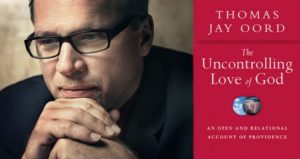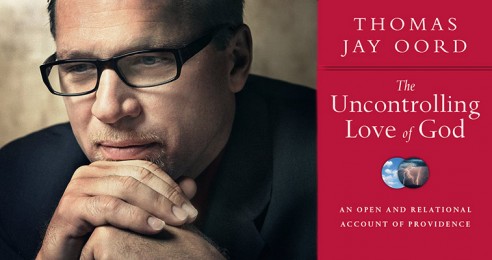 This two-part episode features a wonderful conversation with Thomas Jay Oord, an author, teacher, theologian, and elder in the Church of the Nazarene. Jim McLachlan and Brittney Hartley join Mormon Matters host Dan Wotherspoon in dialogue with Oord, exploring various ways he views God and us as human beings that have great similarities with Mormon ideas (though they also explore key differences), but positions that also have left Tom in somewhat lonely territory within his faith community. These are also positions, along with his tremendous popularity with students, that have led to his being laid off by Northwest Nazarene University, where he has been teaching for fifteen years. As Tom and the panel reflect upon this painful exile, they note how he is in company with many other faithful and committed teachers and theologians within both wider Christianity and Mormonism who have faced similar dismissals.
This two-part episode features a wonderful conversation with Thomas Jay Oord, an author, teacher, theologian, and elder in the Church of the Nazarene. Jim McLachlan and Brittney Hartley join Mormon Matters host Dan Wotherspoon in dialogue with Oord, exploring various ways he views God and us as human beings that have great similarities with Mormon ideas (though they also explore key differences), but positions that also have left Tom in somewhat lonely territory within his faith community. These are also positions, along with his tremendous popularity with students, that have led to his being laid off by Northwest Nazarene University, where he has been teaching for fifteen years. As Tom and the panel reflect upon this painful exile, they note how he is in company with many other faithful and committed teachers and theologians within both wider Christianity and Mormonism who have faced similar dismissals.
But don’t listen to this episode because of this difficulty! Listen instead for the gorgeous and compelling theology Tom presents, especially as he speaks about Love being the primary attribute of God. Along the way, learn about the open theism movement of which he is often grouped, but with whom he differs in key areas. Hear his views about many topics, and when they resonate (and how) with Mormonism, but also his gentle questioning of them and also things about LDS theology and organizational structures that he struggles to see how he might embrace. Hear him reflect on being somewhat marginalized within his church and see if his thinking about “why” he chooses to stay very much engaged with it.
This is a wonderful and engaging conversation. Warning to all who listen, however: You will likely very soon be spending money on one or more of his books! (Which, hopefully, if you do, you will click on the links here on Mormon Matters, and will in that way be supporting the podcast through a percentage it will earn from shopping Amazon through the links or the button on the right side of the page!)
________
Links:
Thomas Jay Oord, The Uncontrolling Love of God: An Open and Relational Account of Providence (InterVarsity Press, 2015)
The Uncontrolling Love of God discussion group
Thomas Jay Oord, Defining Love: A Philosophical, Scientific, and Theological Engagement (2010)
Thomas Jay Oord, The Nature of Love: A Theology (2010)
William Hasker, Thomas Jay Oord, Dean Zimmerman, eds., God in an Open Universe: Science, Metaphysics, and Open Theism (Wipf & Stock, 2011)
Forthcoming book of essays (which includes James McLachlan from this conversation: Uncontrolling Love: Essays Exploring the Love of God, Lisa Michaels, et al, eds. (SacraSage Press, 2017)
Website: thomasjayoord.com
Wikipedia entry for Thomas Jay Oord
Daniel Wright Wotherspoon, Awakening Joseph Smith: Mormon Resources for a Postmodern Worldview, Ph.D. dissertation, Claremont Graduate School (1996)


Comments 6
Awesome discussion! I loved how Tom, although not in our tradition, described perfectly the wrestle I am experiencing with staying while knowing the ugly warts of my faith. It reminded me how there is so much we share with other faith traditions including faith transitions and not accepting some of the teachings and practices that are fed to us. I ate up the discussion on the nature of God as well. My faith crisis has left me not knowing who or what or even if God is and it gave me some interesting thoughts and ideas to keep searching with.
Thanks for your kind words, Natalie. I’m really happy the discussion was helpful to you in some way.
Warm regards,
Tom
At some point each of us is going to die. With our death, the God of time and space will cease to exist but every indication is that our consciousness will continue on past the death of our body and that that consciousness will experience love. What this says to me is that while in mortality we may (or may not) associate love with the God that we have created in our image as mortal beings, love exists, and has always existed, outside of physical reality. What is the source of this love if it is not the God of time and space? We, of course, are incapable of describing what this might be, because our language is restricted to a description of a material world. Even those who claim to have had pure conscious experiences of an alternate reality beyond this physical world, when they return to physical reality, if they make any attempt to describe their experience at all, must do so using metaphors of our physical world that have meaning to us who at this point in time know only a physical reality. But we all do this because we have experiences, sometimes the experience of God’s love, and we want to share those experiences with others. However, we should realize that it is all metaphor. The God of time and space exists only as long as we are experiencing time and space, but love is eternal, and when we die we will likely develop new metaphors in our attempt to describe the source of that love. This does not mean that we should not continue on with what we are doing and saying as best we can, considering the circumstances. We really have no other alternative.
Tom D
Tom D,
You and I have a different understanding of God’s relation to time and space. I think God is everlasting, which means time is real for God always. So I don’t think there will ever be a time in which time and space disappear. Thanks for your comments. Tom
Hello, my question is for Mr. Oord:
First, thank you for joining Dan in this most intriguing discussion. Second, and to my question, I mostly share your belief in a God who is uncontrolling. Yet, I would like to know, why your justification for the uncontrolling nature is love? Could it not be honor or fidelity – to not be hipocritical in declaring the supremecy of freedom God surely could not revoke that of another and furthermore, were He to so restrict the freedom of another, would lose the honor and respect of all other beings? Or could it not be the value which He places on the worthiness and dignity of other agents? I would be obliged if you could expound on the belief that His love precludes him and not some other force, and how critical knowing the why may be.
Thank you,
JMS
Jms,
Thanks for your note. I’m not sure I’m understanding your question well. But it sounds like you and I are on the same page. What makes my position different from some is that I think God’s nature comes before God’s will logically. That means the “respecting the freedom of others” is something God does by nature. Those who think God could choose not to respect the freedom of others because God’s will comes first have a different view from mine. Does that help? Tom